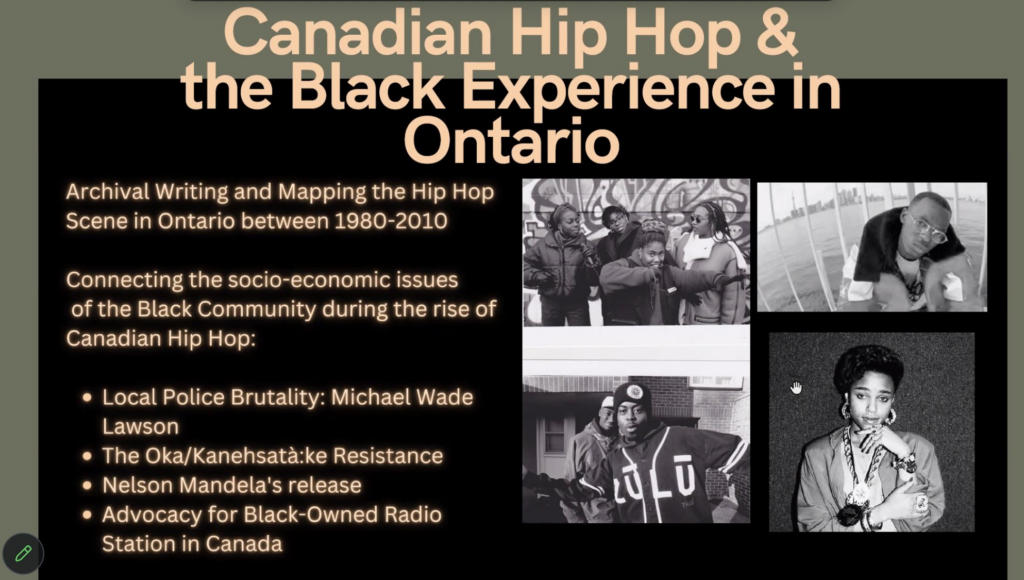
"This archive is where we all meet; it is a body of work that invites the community to enter with their own stories and artifacts. It is an invitation to gather as documented memories are joyfully exchanged and celebrated" - Jessica Felicite
The second of our archives-focused features Jonsaba Jabbi and Alannah Johnson of Building A Black Archive. In contrast to our previous panel, this event highlights the unique considerations and affordances that come with community archiving.

Their presentation opens up with an image that many are likely not familiar with - this image from 1992 depicts the Yonge Street uprising that was a response by young Black Canadians to the recent instances of state violence at the time like Rodney King. This image spoke to Jonsaba and Alannah and they were interested in questions like: Who are these people? What were they feeling? These are things that were missing in existing public archives that Building the Black Archive attempts to alleviate.
Alannah's engagement with this project was motivated by a lot of her personal experiences growing up in the Little Jamaica area in Toronto. Despite growing up here, she didn't learn about the Yonge Street Uprising until she was in university. Building a Black Archive attempts to remediate the archive - it's not just about documenting Black histories, but really rethinking what an archive can and should be to better document Black past and foster more equitable Black futures.

While their work could potentially be defined as a community archive, Jonsaba notes that their work continually destabilizes and challenges these concepts and tries to reimagine what archival practice can be. Nevertheless, operating as an archive outside the space of an institution brings forth unique challenges and considerations, but working outside formalized spaces is also what allows BaBA to do certain things they would not be able to within the institution. One of these things is being able to apply a participatory archival practice that directly engages with local Black communities.

Their first collection was on Black Canadian Hip Hop highlighting folks like Choclair, L.A. Luv, and Michie Mee. Describing the collection, Alannah and Jonsaba show a clip from Canadian Hip Hop legend Maestro Fresh Wes' music video for Nothing At All - a political hip hop song with lyrics akin to classic hip hop protest songs like Fuck Tha Police & Sound of da Police. The song tackles issues like Afro-Indigenous solidarity, as indicated in the lyric "Why are Mohawks being kicked out of their reservations?" Using this music video as archival material gives us a way to acknowledge the histories of Black Canadian resistance that would otherwise be missing.
The second song we explore is k-os' Man I Used To Be released in 2006, an interesting time for the Black community in Canada, especially Toronto. k-os is notable because he was able to cross over to the American market - something not many Canadian artists manage to do!
Man I Used To Be tackles the gentrification of Toronto that was happening during the time (and continues to this day). Chelsi, one of BaBA's artist-in-residence analyzed this music video as an archival artifact, using it to not only document a specific time in Toronto history but also the affective aspects of Black experience during the time that it represents. Alannah and Jonsaba fundamentally ask: How can media artifacts like Trey Anthony's Da Kink In My Hair or these hip hop music videos be sites of cultural memory? What do these tell us about Black experience in Canada?

One of the notable sites related to Black Canadian history is Africville in Nova Scotia that Alannah visited in 2015. While there is a museum and memorial of the since displaced community, where do these folks go? What are the living legacies of these histories of displacement that are missing in this historical documentation focused on the past?

Some of the locations BaBA have identified include Uniacke Square, NS; Little Burgundy, QC, Regent Park, ON, and Queen Mary Park, AB. These histories currently largely only exist through memory.
Storytelling has always been a critical part of (recording) Black history - BaBA wants to explore what this means beyond the academic walls. Beyond just inclusion of oral histories in their archive, Alannah and Jonsaba want to explore what unique affordances actually come with storytelling - what can be said and recorded through storytelling that isn't possible through material culture?
Closing their presentation, Alannah and Jonsaba really want folks to think through - how can we critically engage with both archives and archival processes to better document Black life?
Further Engagements
Readings
Archives